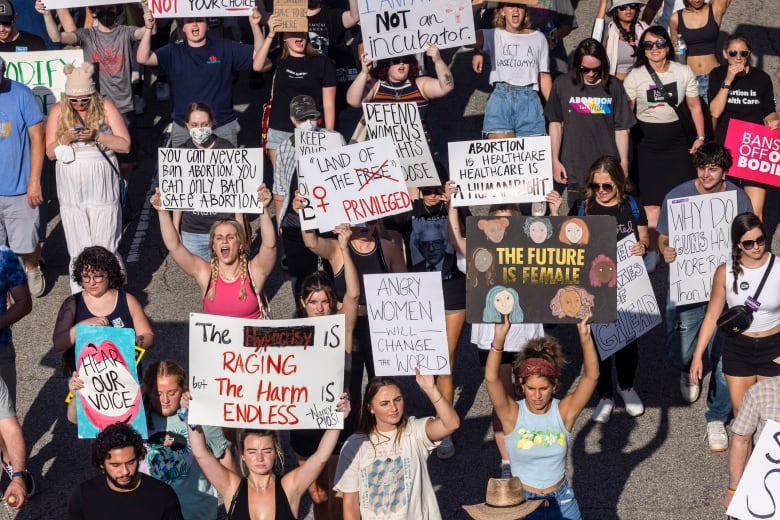Surrounded by states with abortion bans that took effect after Roe v. Wade fell, Illinois is one of the few places where the procedure remains legal in the Midwest — but abortion rights supporters are worried that might not last.
Their concern is shared in at least a half-dozen states, and this year, it's not just about state legislatures. In Illinois, Democrats hold a supermajority, and the governor, a Democrat, is expected to win re-election.
Instead, Republicans could be on the verge of winning control of the Illinois Supreme Court, where Democrats currently hold a 4-3 majority. Two seats are up for election in November, prompting groups that have normally set their sights on other offices to concentrate attention and money on the judicial campaigns.
"Those are the only things we're focused on, because whoever wins control of the court will decide whether abortion remains legal in Illinois," said Terry Cosgrove, president and CEO of Personal PAC, an abortion rights group that has endorsed the two Democrats running for the high court.
The same scene is playing out in other states with contentious high court races on the ballot this year. After the U.S. Supreme Court struck down Roe, state judicial races have become even more important for groups working to protect abortion rights.
"It's increasingly clear that the way access is playing out is at the state level, which puts the role of the court in stark relief," said Sarah Standiford, national campaigns director for Planned Parenthood Action Fund.
Spending records could be shattered

The groups' involvement in states such as Illinois, Michigan and Ohio is a preview of how high-stakes normally sleepy court races are becoming.
In Illinois, Appellate Court Justice Mary Kay O'Brien is raising concerns about abortion rights as she runs against Republican Justice Michael Burke in a redrawn district for a seat currently held by a retiring Democratic justice.
"Now with Roe v. Wade being overturned, women's freedom to choose in Illinois is at risk," a recently launched ad for O'Brien says.
Meanwhile, the race for a court seat currently held by a Republican and covering counties northwest of Chicago pits Republican and former sheriff Mark Curran against Democrat Liz Rochford, a judge. Curran touted his opposition to abortion rights when he ran unsuccessfully for Senate two years ago.
About $97 million US was spent on state Supreme Court elections during the 2019-2020 election cycle, according to the Brennan Center for Justice at New York University's law school. Spending records could be shattered this year in states targeted by the right and left.
The races' importance was underscored recently when the Michigan Supreme Court, where Democratic appointees hold a slim majority, overruled a decision by a state certification board and allowed a constitutional amendment ensuring abortion rights on the November ballot.
Officially non-partisan
While Michigan's races are officially non-partisan, the state's political parties nominate candidates. Democratic-backed Justice Richard Bernstein, who voted to put the abortion rights amendment on the ballot, is up for re-election, along with Republican Justice Brian Zahra, who voted against it.
The Republican Party also nominated Paul Hudson, while Democrats nominated Kyra Bolden.
"Folks here in Michigan are angry about the Roe decision. And I think that when they're looking for places to exercise their freedom to vote, they're going to look to the Supreme Court," state Democratic Party Chair Lavora Barnes said.

Still, the candidates insist they aren't politicians and the role of the court is to be non-partisan.
Zahra, who has served since 2011, described a justice's role as saying "what the law is and not what they think it ought to be."
Abortion rights groups also are closely watching Kansas, where six of the seven Supreme Court justices face a statewide yes-or-no vote to stay on the bench for another six years.
Two of the six were in the 6-1 majority that in 2019 declared access to abortion a "fundamental" right under the state constitution, while another three were appointed by Democratic Gov. Laura Kelly.
Ohio's court is likely to be another battleground over abortion after a county judge temporarily blocked a ban that took effect after the U.S. Supreme Court's ruling.
Rhiannon Carnes, co-founder and co-executive director of Ohio Women's Alliance Action Fund, said her group has been engaging voters on the court races.
"There has just been so much talk about the federal Supreme Court," she said. "We have to do more in the states about the influence and power of our state Supreme Court."

















